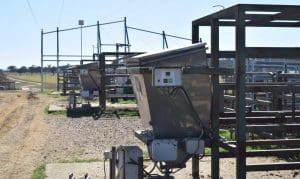The Stage 3 Round 2 (MERiL 3.2) grant recipients will share in over $9 million of funding.
The final four recipients are:
Ruminant BioTech Australia Pty Ltd ($2.79 million) NSW
This initiative aims to validate the efficacy and safety of the bolus containing Tribromomethane through:
- controlled beef cattle trials
- operational settings conducted in partnership with the University of Sydney.
Mort & Co Lot Feeders Pty Ltd ($2.12 million) Qld
Building on previous successes, this project will demonstrate the commercial readiness of technologies for delivering methane-reducing feed additive (Asparagopsis, Bovaer, Agolin, and Nitrate) through lick-blocks to large-scale cattle grazing systems in Queensland.
The University of New England ($3 million) NSW, WA & SA
Building on previous MERiL stages, this project will:
- validate methane-reducing feed additives (Asparagopsis, Bovaer, and Agolin)
- explore their practical delivery to grazing sheep across multiple Australian regions.
The University of Melbourne ($1.14 million) Vic & NSW
This project focuses on dairy and sheep systems in Victoria and New South Wales. It will validate various delivery systems for methane-reducing additive (Polygain & Agolin) in:
- pellets
- liquid supplements
- licks.
The MERiL program comprises three stages of funding, running from 2021–22 to 2026–27.
MERiL complements the government’s other investments to support emissions reduction in the agriculture industry. This includes $63.8 million as part of the development of the Agriculture and Land Sector Plan.
The program also contributes to Australian’s commitment to the Global Methane Pledge. The pledge is a voluntary commitment to reduce global methane emissions across agriculture, energy and resources and waste sectors.
Source: Department of Climate Change, Energy, the Environment and Water


These potential feed supplements will only be used in feedlots and must have a productivity gain for operators to use them.